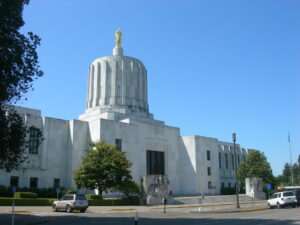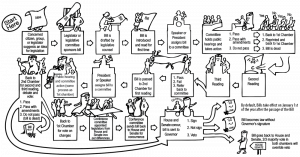
The Oregon Legislative Assembly is set to return for the 2023 legislative session on January 9 for «legislative organizational days». These days include the swearing in of members-elect, the introduction of bills, and the announcement of committee memberships in the houses. The Legislative Assembly will begin its convening for the purposes of lawmaking on January 17; the session will last for 160 days, ending on June 25, 2023.
Like the United States Congress, the Oregon Legislative Assembly consists of two houses: the Oregon State Senate and the Oregon House of Representatives. It was not that long ago that these part time legislators would be returning the Capitol building after a more than a year break. Originally, Section 10 of Article IV of the Oregon Constitution established that the Legislative Assembly would meet in a regular session once every two years. Since the late 1800’s, that meant that the legislature’s regular sessions occurred in odd-number years, like most states who followed the biennial legislative session calendar. This changed with the approval of a statewide ballot in November of 2010.
The Oregon Legislature Annual Sessions Amendment (Measure 71), a legislatively referred constitutional amendment, was ratified by the voters with roughly sixty-eight percent of the vote. The measure amended the state Constitution to require a 160-day session for the Legislative Assembly in odd-numbered years and shorter, 35-day session even-numbered years. This change to the legislative calendar was a long time in the making. Two decades earlier voters rejected a similar measure and through the mid-2000’s legislators worked on – but could not agree to – an annual structure. At the time of its ratification, Oregon was one of only five states left that had legislators meeting just every other year.
As Measure 71 was worked out in the legislature, a key component to the negotiations was the focus of the 35-day ‘short’ session. Some argued that the short sessions should focus solely on budget adjustments and addressing emergency issues. This language was never included in the amendment itself, but a number of lawmakers still hold the view that these even-numbered sessions should limit its scope to addressing those issues, and not larger policy debates.
With 2023 being an odd number year, the long session is sure to include a wide-ranging number of issues to be addressed. Democratic leaders in the state legislature have cited issues such as infrastructure, workforce investment, and campaign finance reform as major topics they are looking to address. Republican leaders are considering their own legislative priorities, including providing a «substantial kicker for those families who have paid taxes», as well as lowering taxes.
This week’s Current Events resources examine the 2023 Oregon Legislative Session, its short and long session origins and the issues being decided by legislators.The resources shared provide information and context surrounding the Oregon Legislative Assembly.
Essential Questions, Vocabulary & Extend the Resources:
- From where does the Oregon Legislature derive its power?
- What role does the Oregon Legislative Assembly play in the creation of new laws?
- What roles do the OR House/Senate have in writing and ratifying bills? What role do committees play in the legislative process?
- Why does the Oregon Legislature have a ‘long’ and ‘short’ session?
- What are the pro’s and con’s associated with an annual legislative session? What are the pro’s and con’s associated with a biennial legislative session?
- What role do citizens play in the Oregon legislative process?
- In your opinion, does the current way Oregon creates law seem like the best system for the state? Explain.
Click here for a hardcopy of the Essential Questions and Oregon Legislature Vocabulary
Click here for a hardcopy of Extension Activities CLP suggests implementing with this content
Videos:
Podcasts:
Oregon Republicans lay out legislative priorities for 2023 session, Think Out Loud, December 8, 2022
Oregon Democrats lay out legislative priorities for 2023, Think Out Loud, December 8, 2022
Background Resources:
How Ideas Become Law, Oregon State Legislature
Oregon State Legislature Calendar, Oregon State Legislature
Your Capitol – Your Oregon, Oregon State Legislature
Annual vs. Biennial Legislative Sessions, National Conference of State Legislatures, July 1, 2021
Images & Infographics:

Recent Articles:
Bipartisan rural infrastructure package proposed, North Coast Citizen, December 21, 2022
Advocates seek to strengthen laws against domestic violence in Oregon’s 2023 legislative session, KGW8, December 18, 2022
Performance venues, arts groups ask Oregon lawmakers for more COVID recovery funds, The Oregonian, December 11, 2022
Oregon Health Authority Rolls Out Its 2023 Legislative Agenda, The Lund Report, December 6, 2022
Critical shortage of public defenders reaches into all corners of Oregon’s criminal justice system, OPB, December 9, 2022
Amid explosion of illegal marijuana production, Oregon looks to toughening laws, PBS News Hour, December 8, 2022
First look at Oregon’s new e-bike rebate legislation, Bike Portland, November 28, 2022
Recent Editorials:
Opinion: Public safety challenges require increased funding for prosecutors, The Oregonian, December 28, 2022
Energy and climate debate in Oregon coming to buildings, The Observer, La Grande, December 11, 2022
Lesson Plans:
«Why Compromise?», National Conference of State Legislatures
Who Represents Me?, iCivics
How to Draft a Bill, Citizen Advocacy Center
Lesson Plans for Elementary Students:
School Lesson Plans, 4th Grade, Oregon State Legislature
Comparative Government in Oregon, PBS Learning Media
The roles of state and federal governments, Newsela

